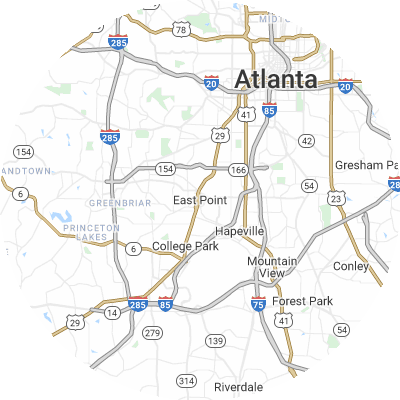Please enter a valid 5-digit zip code!
Written By David Cusick
Last Updated February 2024
Rooftop solar is one of the most easily accessible forms of renewable energy for East Point residents. Going solar can help cut your utility bills and reduce your environmental impact. But you'll want to find a trustworthy installation company first. That’s why we’ve researched the options and assembled a guide to the most dependable solar providers in East Point. These top companies offer high-quality and reliable services.
Clear pricing policy
Reliable customer support
Free quotes
Services Offered
Free quotes
Clear pricing policy
Reliable customer support
Services Offered
Free quotes
Clear pricing policy
Informative resources
Services Offered
Reliable customer support
Informative resources
Clear pricing policy
Services Offered
Prompt service delivery
Reliable customer support
Free quotes
Informative resources
Services Offered
Clear pricing policy
Free quotes
Reliable customer support
Services Offered
Free quotes
Informative resources
Family-operated business
Reliable customer support
Clear pricing policy
Services Offered
Reliable customer support
Clear pricing policy
Free quotes
Services Offered
Informative resources
Free quotes
Reliable customer support
Clear pricing policy
Services Offered
Reliable customer support
Informative resources
Free quotes
Services Offered
Today's Homeowner looks at dozens of datapoints on solar companies to come up with our data-driven rankings. It's not possible for a company to pay for preferential treatment in our rankings. We look at the following key factors in determining who should top our list:
Adopting solar power lets homeowners cut utility bills while helping the environment by reducing your carbon footprint using clean energy. If you’re evaluating if you want to go solar, consider these key factors for choosing an installer.
Confirm that your solar installer is properly licensed. This helps ensure that the work is done properly using the most up-to-date installation methods. Georgia doesn't have solar-specific contractors' licenses, but the law does require solar installers to be licensed electrical contractors. The Georgia Secretary of State manages licenses and business filings.
Check Google Reviews, TrustPilot, the Better Business Bureau (BBB), and other review sites to see what past customers are saying about local solar providers. Detailed reviews can help you assess a provider's trustworthiness and customer service. Be wary of companies with few or mainly poor reviews.
Call 3–5 solar companies for free, itemized quotes. The quotes should explain all costs and list the solar equipment included. Reviewing multiple quotes helps identify the best option that fits your budget.
Top-notch solar installations should come with strong workmanship and performance guarantees. A workmanship warranty covers installation issues, such as poor alignment, cracks in the panels, or poor wiring. A performance guarantee ensures a minimum energy output. Comprehensive warranties show that a solar company believes in its work.
Solar energy can help reduce your energy expenses. Be sure to evaluate these aspects when determining the cost and value of solar panels.
In East Point, solar panels cost an average of $3,740 per kilowatt, with an average system size of 6.8 kilowatts. The typical East Point homeowner spends $17,801 on their solar array after federal tax refunds. An estimate from a local provider will take into account additional information based on your desired system's panel type, size, capacity, and required preliminary work. In some cases, homeowners may prefer leasing solar panels to reduce upfront costs.
Incentive Type: Sales Tax Incentive
Incentive Amount:
100% exemption
Incentive Amount:
Single Family
Central AC Replacement: $50
Air/Duct Sealing: $300
Attic Insulation: $250
Heat Recovery Water Heater with Heat Pump: $250
Heat Pump Water Heater: $250
Solar Water Heater: $250
Home Energy Assessment: $150
Smart Thermostat: $75
Heat Pump conversion: $250
Multifamily
Central AC Replacement: $25
Air/Duct Sealing: $150
Attic Insulation: $125
Heat Recovery Water Heater with Heat Pump: $250
Heat Pump Water Heater: $250
Solar Water Heater: $250
Home Energy Assessment: $75
Smart Thermostat: $38
Heat Pump conversion: $125
A solar photovoltaic (PV) array can generate power to run any electric appliance or system in your home. More specifically, you can install a solar water heating system.
There are many benefits to home solar energy. You can save money, raise your property values, and qualify for tax benefits. With the right storage equipment, solar panels can also offer you further energy independence and offer some protection from power outages.
It depends on your home's location and what type of panels you're installing. With the winter months in Georgia being very mild, you have a wide time window to install your panels, though they won't achieve peak performance until summer arrives.
Of course. The grid in East Point already uses a large share of renewable energy sources, and you may be able to sell your excess generated energy to your utility for additional cost savings.
Your installer can give you an estimate of what your energy bills will look like after you install solar panels. Generally, your energy bills will decrease significantly because you'll be using energy from the sun for free, instead of buying energy from the utility company. The average annual savings in East Point amount to $1,403.
Regarding taxes, the federal government offers a tax credit of up to 30% of the panels' cost. Depending on where you live, you could also claim or apply for state or property tax incentives. For insurance, your monthly premium may be slightly higher because solar panels increase your property's value. You should speak with your accountant or insurance agent for information specific to your case.
Solar panels are on par with other forms of renewable energy. Their maintenance costs are low and today's systems can work in a variety of conditions.
